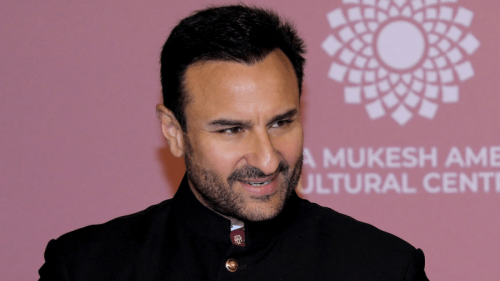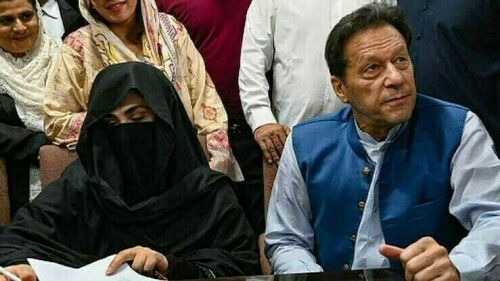
It’s been eight years since Haaris Waheed first walked in front of the gimlet eye of a television camera. He had been studying at the National Academy of Performing Arts (Napa) when he decided that the stage did not excite him. The camera lured him in and Haaris embarked on a TV career which now boasts a repertoire of hit roles and impressive performances.
“I never found theatre to be exciting,” Haaris tells me. “I didn’t see any charm in standing on stage and speaking loudly so that the person right at the back of the auditorium could hear me. The camera is so much more challenging, when you’re completely in focus, and sometimes you don’t have any dialogues and you have to dive into yourself so that your face reflects your emotions.”
There are certain emotions that I — and avid drama watchers will agree with me here — particularly associate with Haaris: the insolent sneer, the face rigid with anger, the frown indicating the planning of a malevolent scheme.
Haaris is a very talented actor who often gets typecast into playing the evil younger brother or cousin or friend. This is something I mention to him and he nods, smiling.
Haaris Waheed is a talented actor who is often typecast into playing the evil younger brother or cousin or friend. Is he happy with his career arc after eight years in the business? And what does he feel about life in general?
“It’s changing slowly,” he says. “I have deliberately stopped taking on certain roles. It’s very important for me to get a rush while I am performing. Over the past eight years, I feel that I have figured out the mechanics of playing certain kinds of characters. I now feel the need to be part of other kinds of stories, in order to keep enjoying what I do.”
He continues, “For me, the character matters much more than whether he is good or bad. The audience often likes to see things in black-and-white, imagining the hero to be a saviour and the villain to be completely evil. I prefer greys. Even a negative character is driven by reasons that he or she considers to be right. I enjoy acting out these characters with shades.”

Why does he think he gets cast so often as the negative character? He muses, “People tell me that I am a very good actor. I don’t pay too much attention to this but, still, maybe negative characters need to be played out by actors with strong screen presence. How will the good characters be perceived as good if the villain isn’t believably bad?”
It’s a very intuitive observation — Haaris, during the course of our interview, makes so many of them. At one point, I tell him that he thinks very deeply, to which he starts laughing. “I am just doing so now. Usually, I am just going along with life, not really thinking everything out!”
Nevertheless, Haaris Waheed has some distinctively unique opinions about his career, and life in general. For instance, he tells me that he doesn’t really fixate over how the audience will react to a role or a particular scene of his.
“It just doesn’t occur to me,” he confesses. “Once I have wrapped up shooting for the drama, I am on to the next project. By the time the various scenes air, I am in a different headspace, on another journey altogether.
“Also, when I see a scene of mine, usually I start dwelling over how I could have enacted it differently rather than think about whether the audience will like it. I critique my own work to the extent that if any praise comes my way, I know exactly how much I should believe in it.”
Has he ever been trolled for playing a negative character? He shakes his head. “No. People tell me that I am a good actor and they want to see me in positive roles. But I have never been trolled for playing a negative character.”
What have been his most favourite roles of his own, to date? “Sammi,” he says immediately, mentioning one of his earlier acting projects. “The shoot location was outside of my immediate world, for one. I played a village boy who murders someone. I enjoyed trying to depict how he functioned, what circumstances prompted him to become the way that he was and made him hurt someone.”
He then proceeds to name his most recent TV drama role. “I also enjoyed acting in Jhoom. It was an exciting shoot and had such a refreshing story, focusing mostly on young people. The drama had fewer episodes, which meant that the story was more crisp and interesting and not repetitive.
“Usually, when you’re working in a drama that spans 40 episodes or more, you shoot eight to 10 scenes in a day and end up repeating some of the dialogues. It can be boring. Also, Jhoom was filmed on big frames, like a movie, and the drama was just a ride. We would often quip that, true to its name, Jhoom had made all of us dance!”
Does he think that there is a TV drama audience that appreciates shorter narratives?

“There is,” he nods. “Attention spans are getting shorter. Having said that, there is still an entire market that likes to watch long dramas. I think most of these people are from an earlier generation, perhaps around the age of my parents. Younger audiences definitely like stories that are crisper.”
In most cases till now, the drama industry is dominated by stories that go on and on and scenes that get repeated and drawn out in slow-motion. Is he happy with acting in TV dramas and with his career, overall? Haaris shrugs.
“TV dramas are mainly what we have, so, naturally our careers will largely be dependent on them. And I am generally happy as a person. Yes, it is a tough industry to be an actor in.
“Pakistan’s media fraternity does not get any support from the government. The power players in the industry all run privatised businesses. They may work in dramas but they also run production houses or own channels.
“This doesn’t mean that I am unhappy. I am just generally stating realities that I have observed. Personally, I am happy that so many people like my work.”
The ‘not unhappy’ remark makes me probe a bit about Haaris’ personal life. He was, until recently, married to an actress. The two have now gone their separate ways, which prompts me to ask him: was it difficult to be married to someone from the same industry as him?
“It doesn’t matter if two people are from the same industry,” he offers. “Marriage in itself is very complex and sometimes two people are able to make it work and sometimes they don’t. I come from a broken family myself, which is perhaps why I know that the breaking up of a marriage isn’t necessarily a bad thing.
“It can be healthy too,” he continues philosophically. “We all come into this world alone and, eventually, we will leave it alone too. Once you know this, it becomes easier to sort things out.”
We spiral back to his days with Napa — or rather, a time when he had quit Napa but the academy’s artistic director at the time, Zain Ahmed, reached out to him for helping out with an international theatre festival taking place there. That was back in 2014.
“I had helped him in the past in a play and, now, he asked me to help out. I asked him what would be the tipping point for convincing me. He replied that I would be helping out with the show being staged by guests from India, actors Naseeruddin Shah, Ratna Pathak Shah and their daughter Heeba Shah. I told him, I was coming immediately!” He smiles.
Was he star-struck?
“Of course, I was!” he says. “I had seen so many of Naseer sahib’s movies while growing up. They were there for five days, I think, in which, for two days, they were doing rehearsals. I was with them throughout and I learnt a lot.
“There was a precision and dedication with which they worked. The troupe was performing a series of skits that they must have performed 1,500 times before. Still, after the performance, they would gather together to discuss anything that might have gone wrong.
“In Heeba’s skit, the light was once shut off maybe two seconds before it was supposed to. Naseeruddin Shah pointed this out and made the team go through the process again so that they wouldn’t make the same mistake again!
“I think that he must have been 60 at the time [he was 64], but he was almost religious about his work. I remember that he had a backache on the day of the last show. It was my job to tell him when his cue on stage was about to come and when I went to the dressing room to call him, he was lying straight.
“He gave me his hand so that I could pull him up and I helped him to the stage. I thought that he wouldn’t be able to perform that day but, as soon as he stepped on to stage, he straightened his back and was suddenly infused with this new energy. There was something inside him that he had tapped into.”
Did he ask Naseeruddin Shah for any advice? “I asked him if he, like me, felt attracted towards the camera rather than the stage. He told me that he loved theatre, but when he was younger and would be working on the stage, it would be his dream to make it in the movies so that his work could be seen by more people.”
Does Haaris also aspire to be seen in certain kinds of roles by the TV audience? “There is a role that I am writing. Perhaps that …” his voice trails off. “A lot of times, acting is about selling dreams, where one person is perceived as good and the other as bad. There are no shades. I don’t like selling those dreams. I like to show a mirror to society.
“More importantly, though, I am happy with where I am, even though I know that there is so much more that I can do and will do. It is important to be a good actor, but also a good human.”
That’s very deep, I comment to him again. He laughs. “Only for this interview!”
Published in Dawn, ICON, September 10th, 2023














































Dear visitor, the comments section is undergoing an overhaul and will return soon.